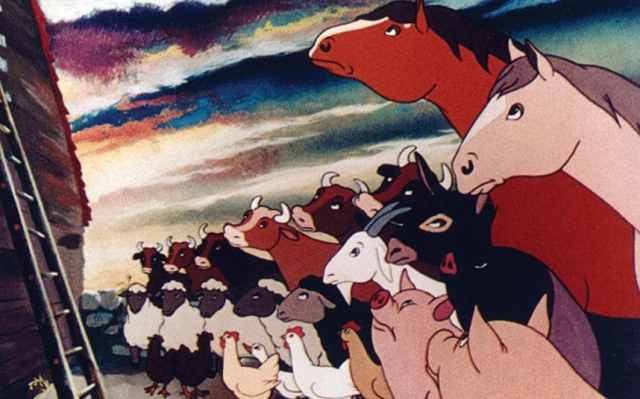
The recent release of “Mr. Jones,” a drama about the Welsh reporter who broke the story of the man-made famine Stalin imposed on Ukraine in the 1930s, is framed by journalist, critic and novelist George Orwell’s writing of “Animal Farm,” his scathing satire of Stalinism and totalitarianism.
Orwell, in the film, was an idealistic socialist-journalist who met Gareth Jones just as his story was about to break, and the aspiring novelist had his eyes opened by what he learned. Stumbling across the original, moving and generally faithful 1954 British animated version of “Animal Farm” on Tubi (one of several platforms where you can see it), I rewatched it to see what I could pick up from Orwell’s parable, watching it anew in a very different era from when it was created.
This animated classic was CIA-backed, pushed into production as the Cold War had moved from warm to hot. The Korean War, Soviet Russia stealing A-bomb secrets and exporting revolution all over what would come to be known as The Developing World, backing communist parties in war-ravaged Europe, you could see why the CIA would be interested in a little cinematic pushback.
The film’s messaging is blunt. But watching it now there are subtleties which perhaps the spy agency’s propaganda-purchasers didn’t have in mind when they got behind it.
The one screenwriter I can vouch for might be part of the explanation for that. I met American filmmaker Borden Mace as he was shooting a labor documentary, “The Uprising of 1934,” in the ’90s. That film was about wildcat textile strikes brutally put down across the South, scarring the region and setting back unions here for decades and decades. Mace made a lot of movies like that. He was an old-school post-Stalinist leftist filmmaker, or would go on to become one after his “story consulting” on “Animal Farm.”
What the film, like the novel, lays bare is the inherently corrupt, greedy and venal nature of humanity. “All animals are equal” morphs into “But some are more equal than others” as the cunning “pigs” among us seek more luxury, comfort, food and power, once they get control of government (Manor Farm).
The stand-ins for the monstrous Stalin (Napoleon, the pig), his cowardly but ruthless sidekick Beria (Squealer) are obvious. Snowball, the smartest pig, and most idealistic, but chased away and murdered, is Trotsky.
Watch “The Death of Stalin” if you need a refresher course on Stalin’s reign.
But giving a scheming pig Conservative Winston Churchill’s blustering voice (Maurice Denham) is no accident.
For all the point-blank shots at totalitarianism, Communism and dictators creating their own “elite” (the pigs) and Special Police (dogs, raised to be loyalists), there’s a healthy dose of Socialist Europe, and a post-National Health Service Britain endorsed by the preachings of the animated “Animal Farm.”
Idealism, socialism and “people’s rule,” aren’t mocked. Capitalism is disdained. “Embargoes” are shown for the exercises in cynicism that they are. There’s always a dirty dealer capitalist more than happy to trade with “the farm,” or launder Russian mob money in bogus real estate schemes.
Yeah, it resonates today. There’s Mr Whymper, our skulking backroom business hustler, a Deutsche Bank plutocrat putting Russian money and an American mobster/con-artist together, heedless of those who will be hurt or even killed “for profit.”
The “Our leader, wise as he is loved” accolades are straight out of Bolshevism, Nazi Germany, North Korea or wherever “cult of personality” rule is embraced by the “sheep” (literal, here).
The promise of happy life and “luxury for all” that Snowball preaches might be a legitimate promise, coming from him. But those who “have” are all too aware that they need to keep those who “don’t have” in their place, if they want to continue to “have.”
The animation isn’t Disney-smooth, but it is lovely in its own right, with a color palette that reeks of foreboding and character design that leaves no doubt who the villains are.
The CIA was good at that.
Using voice-over narration to tell the story and make its points is always a shortcoming, but seeing the alternative — TNT’s botched 1999 American TV version — underscores how right it was for this anti-commie fairy tale.
“Animal Farm” lives on, long after the collapse of the Soviet Union, because Russia is still closer to that state than a democracy, China may never abandon its “Some animals are more equal than others” ethos and North Korea remains enslaved.
And the world’s fresh outbreak of “strong men” and cult of personality leadership makes it even more topical. Ruthless cunning can still convince the sheep to believe lies that they’ve seen laid bare, with their own eyes, no matter what their nationality.
CIA-backed or not, Fall of the Soviet Union be damned, this more-subtle-than-you-think version of Orwell’s novel still resonates and remains relevant in an age of “Strong Men” rule.

MPAA Rating: unrated, violence
Cast: The voices of Gordon Heath and Maurice Denham.
Credits: Directed by Joy Batchelor, John Halas, script by Lothar Wolf, Borden Mace, Joseph Bryan III, Joy Batchelor and Philip Stapp, based on the George Orwell novel. An Associated British-Pathe, Louis De Rochment release.
Running time: 1:12


